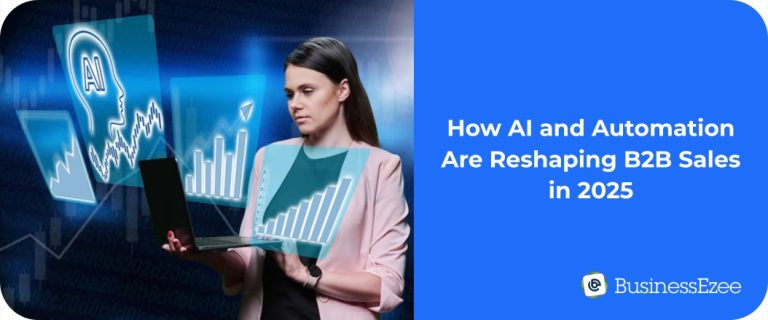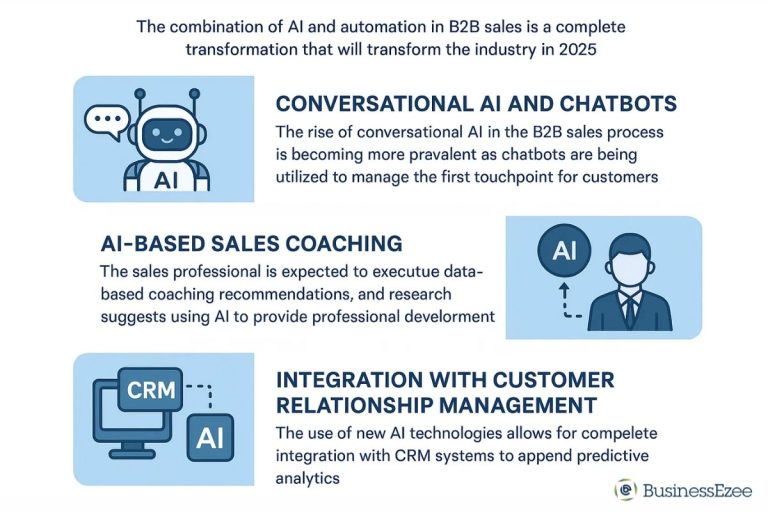How B2B Trading Software Is Evolving with AI and Automation in 2025
The field of B2B sales is undergoing a revolutionary metamorphosis in 2025, fueled by the tremendous integration of artificial intelligence and automation technologies. B2B sellers and sales managers now find themselves in a new environment, where hitting quarterly sales quotas will require more than skillful selling because businesses are using AI-powered capabilities to hire for their sales capacities.
The digital revolution is fundamentally changing the ways in which organizations think about prospect identification, lead qualification, and customer relationship management. Armed with big data, predictive analytics, intelligent automation, and data-informed insights, sales teams are generating conversions that were simply not possible just a few years ago at reduced costs and with better customer experiences.

The Current State of AI in B2B Trading Software Sales
AI is no longer just a trend—it’s transforming how B2B trading software operates. From smarter sales processes to predictive insights, automation is leading the shift.
AI is now at the tipping point for B2B sales readiness
By 2025, digital channels will be responsible for 80% of all B2B sales engagements. This will continue the shift from traditional sales processes to ones relying on technology. This is not just a matter of digitization is about intelligent automation with a clear understanding of customer behavior and the ability to make predictions and adapt sales strategies in real time.
Market Statistics & Trends
The statistics paint a very encouraging picture of the effects of AI on B2B sales performance. Organizations that rely on automation generate 25% higher revenue than those that don’t. Marketing automation can provide an ROI of 544%. These numbers push organizations to deploy more automated and AI-based sales systems to keep pace with the competition in the continuing digital economy.
Moreover, 74% of sales professionals believe AI will redefine their jobs. This is not just about technology; this is about totally reimagining how they do their jobs and offer value to their customers.
Key AI Technologies Transforming B2B Sales
Artificial Intelligence is changing the way B2B sales teams operate.
From lead scoring to predictive analytics, AI is driving smarter decisions.
AI is now at the tipping point for B2B sales readiness
The numerous ways that B2B sales automation is changing, nothing is bigger than predictive analytics. Businesses are applying more sophisticated algorithms to report on shifts in market direction and consumer behavior so they can proactively prepare a plan. Companies can now take advantage of this technology to spot high-value prospects earlier than their competition, optimize pricing practices, and manage human and financial resources more effectively.
As new AI technologies serve up staggering amounts of historical data, customer interaction data, and are connected to market signals, the new breed of AI systems can determine which leads will be most likely to become successful conversions. That means AI will help sales teams put their buying energy and selling strategies only against the best opportunities, which allows for an increased conversion percentage and, once again, increases sales activity capacity.
Smart Lead Qualification and Scoring
AI-driven lead scoring systems have advanced beyond simple demographic matching into behavioral analysis. These systems can analyze details of prospect engagement, content consumption trends, and definitive buying signals to assign appropriate lead scores. With this level of automation, sales teams can focus their work only on prospects with the highest likelihood of converting. Resulting in much greater productivity and higher success rates for sales teams.
Automated Personalization at scale
In addition to providing a manual level of personalized service and engagement, automation provides a revolutionary means of personalization at scale. Intelligent algorithms assess customer preferences, order history, and behavioral patterns to identify ideal messaging, including product recommendations, and the best approach to sell to each prospect/customer. Personalization at this level was not previously possible without AI; however, it is now available through intelligent automation.
Future Trends of B2B sales in 2025

Conversational AI and Chatbots
The rise of conversational AI in the B2B sales process is becoming more prevalent as chatbots are being utilized to manage the first touchpoint for customers independently, qualify prospects, and manage schedules and appointment bookings. These solutions provide 24/7 responsiveness, consistent messaging, and immediate response time to customers.
AI-Based Sales Coaching
Advanced AI systems are using calls, emails, and meetings to analyze and prescribe coaching recommendations in real time. These tools are recognizing communication patterns that produce favourable outcomes, share what successful sales professionals do for follow-up, get the sales professional to execute data based coaching recommendations, and research suggests using AI to provide professional development may enhance performance levels for some sales professionals.
Integration with Customer Relationship Management
The use of new AI technologies allows for complete integration with CRM systems to append predictive analytics to customer information, along with automated recommended actions. Integration allows sales teams to leverage rich contextually relevant, up-to-date information to provide maximum value to the customer.
Challenges and Considerations
Data Quality and Management
Sales automation powered by AI will only succeed if organizations have good management processes for their data. Organizations will want to use accurate, enriched, and well-organized data to ensure that AI algorithms will be effective. Poor data will lead to inaccurate predictions and poor sales results.
Training and Adoption
AI technologies have tremendous potential, but successful technology adoption in organizations is dependent on the professionalism of the training and change management processes. Sales teams, for example, will want to know how to best take advantage of AI technologies, but still add that “human” aspect of B2B relationship building that is still critical even in the age of AI.
Privacy and Compliance
As more customer data is processed by AI systems, and the number of privacy regulations multiply, organizations will have to continue to contend with privacy and compliance issues. With the requirements of securely storing data and ensuring customer trust while trying to leverage AI, sales organizations have increased pressure to monitor data fulfillment for compliance.
Preparation for the AI-Driven Future of Sales
Investing in a fit for your tech stack
It is essential to assess AI solutions to identify those that are the best fit for their selling processes and goals. The right tech stack must integrate well with existing tech infrastructure and be scalable for future use.
Developing AI-Ready Sales Professionals
Being successful in an AI-driven selling context will require teams capable of working with intelligent systems. To be AI-ready, sales professionals will need training to manage and make meaning of AI insights, utilize automation tools, and ensure that, as selling becomes more automated, the human elements remain that separate great sales performance from average performance.
Creating a Culture Engaged with Data
To maximize the value of their AI investments, organizations will need to foster a culture where data-driven decision-making and continuous improvement become fundamental principles and processes. A data-driven culture allows organizations to derive the maximum benefits from their AI investments while ensuring that teams are able to make better decisions.
Conclusion
The combination of AI and automation in B2B sales is a complete transformation that will transform the industry in 2025, and the organizations embracing this technology are documentable improving sales efficiencies, customer satisfaction, and revenues! While our interests may be primarily in the technology adoption, success in this context is about more than the technology; it’s about implementing well, training well, and being willing to iterate for improvement over time.
As AI continues to grow and develop, it will become more and more apparent that the competitive advantage will belong to those organizations that can blend intelligent automation and human creativity most effectively. The B2B sales process is not about removing the human sales professional, but rather assisting the sales professional with AI tools that enable them to deliver tremendous value to their customers.
BusinessEzee offers all sorts of tailor-made B2B trading management software solutions.
Get started with Businessezee now and take the first step toward sustainable business growth.

